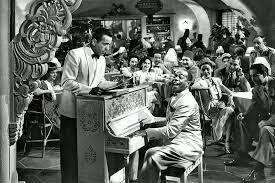Knock on Wood
“Knock on wood” is a common expression with a complicated past.
“Jake’s having a great season this year. He’ll set a school record, no problem, knock on wood.”
“In all the years since I got my license, I’ve never been in an accident, knock on wood.”
“Tara hasn’t had any problems with the pregnancy so far. It should be an easy birth, knock on wood.”
This expression serves not only as a wish for continued good luck but also as a protection from a jinx that might result from bragging. It helps the speaker avoid bad luck.
There’s some debate about the number of knocks that you need – Some say two (or any even number) and others say three. In Disney’s “Encanto,” poor Bruno, who’s gotten a little strange from being in hiding so long, enters the passageway backwards while saying “Knock, knock, knock, knock on wood.” Plus he has his fingers crossed and he tosses a handful of salt over his shoulder. He’s a mess, needing all the magical help he can find. https://www.youtube.com/watch?v=1vSpiK1U0iI

In “Casablanca,” Sam (Dooley Wilson) plays a song called “Knock on Wood,” which becomes a way for the refugees in the café to forget their troubles for a moment in a singalong. “Well, smile up then, and knock on wood.” https://www.youtube.com/watch?v=8_f8snT93Bc “Your luck will change if you’ll arrange to knock on wood.”
Eddie Floyd’s version of “Knock on Wood” claims his lover is so wonderful he’s afraid of losing her, so he’s going to knock on wood. https://www.youtube.com/watch?v=1-KWX26Dwv8 “I don’t want to lose you….It’s like thunder, lightning, the way you love me is frightening, so I better knock on wood.” Another famous version of the song is by Amii Stewart.
These examples show the wide range of application for the practice. It’s a form of protection from bad luck, but it’s also a request for better luck.
Touch wood
In England, people say, “Touch wood” instead of “Knock on wood.” Folklorist Steve Roud claims the term came from a children’s game called “Tiggy Touch Wood,” in which children use a piece of wood as a safety, like the can in Kick the Can. While the relationship is interesting, it could just as well prove the opposite view – that the game got its name from the belief, which seems more likely.
Others believe the “wood” refers to the Holy Cross or any representation of it, such as a crucifix. Folk beliefs have as many versions as the people who continue them.
What’s most interesting to me is its universality. Some form of touching wood can be found across the globe, though the particulars of the wording and even the wood differ from place to place. Often, it’s combined with references to the Evil Eye, the idea that others can harm you through dislike and/or envy. For instance, in Iran, the expression “I am knocking on wood to prevent (someone) from being jinxed” invokes the ability of wood to ward off bad energy such as the Evil Eye. In Poland, people knock on unpainted wood when saying something negative to prevent it from happening, or when saying something positive to prevent it from being spoiled.
Origin
 The Dryad by Evelyn Morgan
The Dryad by Evelyn MorganSo where did it come from? The most logical explanation seems to be ancient beliefs in spirits that lived in trees. But even that answer has many versions. One is that people would knock on trees to connect with the spirits inside to gain strength or to avoid bad luck. Greek myths held that dryads – nymphs – inhabited old trees, particularly oak trees. They could grant your wishes or, if angered, ruin your life. So it was a good idea to stay on their good side. This then morphed into knocking on any piece of wood. According to the Brewer’s Dictionary of Phrase and Fable, “traditionally, certain trees, such as the oak, ash, hazel, hawthorn, and willow, had a sacred significance and thus protective powers.”
Other sources point to the Celts’ belief that touching tree trunks was a way of acknowledging the powerful spirits within and asking for their protection. Turks in Central Asia shared the same belief. This also becomes a kind of insurance policy against the wrath of these spirits if you’ve been bragging about your past successes or predicting future ones. If nothing else, maybe the knocking distracts the spirits from your boasting.
Ultimately, knocking on wood has become a social convention rather than a spiritual belief. It shows that you don’t want something bad to happen to someone – or that you’d like to see the current good luck continue. But hidden in that convention is the companion concern that being too sure of your luck invites trouble. You don’t want to “tempt fate.” So, definitely, knock on wood.
Sources and interesting reading:
Andrews, Evan, “Why so people knock on wood for luck?” History.com, 22 August 2018, https://www.history.co/news/why-do-people-knock-on-wood-for-luck
D-Este, Madeleine, “The Origins of ‘Touch Wood’” Tree Spirits, The True Cross, or Tag?” Folklore Thursday, 27 July 2017, https://folklorethursday.com/folklife/the-origins-of-touch-wood-tree-spirits-the-true-cross-or-tag/
“Dryad,” Wikipedia, https://en.wikipedia.org/wiki/Dryad (source of dryad image)
Hathaway, Rosemary V. “Why we knock on wood for luck,” The Conversation, 30 January 2020, https://theconversation.com/why-we-knock-on-wood-for-luck-129864
“Knock on Wood,” Phrase Definition, Origin & Examples, Ginger, https://www.gingersolftware.com/content/phrases/knock-on-wood/
“Knock on Wood,” GoodLuckSymbols.com, https://goodlucksymbols.com/knock-on-wood/
“Knocking on Wood,” Wikipedia, https://en.wikipedia.org/wiki/Knocking_on_wood
Quinon, Michael, “Touch wood/knock on wood” World Wide Words: Investigating the English language across the globe, www.worldwidewords.org/qa/qa-tou1.htm
Ronca, Debra, “Why do people knock on wood for luck?” How Stuff Works, https://people.howstuffworks.com/why-do-people-knock-on-wood-for-luck.htm
“Why do we knock on wood?” Sporcle, 12 September 2019, https://www.sporcle.com/blogg/2019/09/why-do-we-knock-on-wood/ “Why do we knock on wood?” TED-Ed blog by Lisa Bracio and Stuart Vyse, https://blog.ed.ted.com/2017/05/18/why-do-we-knock-on-wood/



